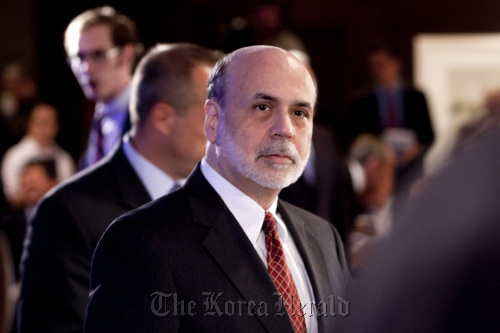Fed chief says brinkmanship threatens to backfire and harm the economy
WASHINGTON (AP) ― Federal Reserve Chairman Ben Bernanke on Tuesday urged Republicans to support raising the nation’s borrowing limit. He said threatening to block the increase to gain deeper federal spending cuts could backfire and worsen the economy.
Even a short delay in making payments on the nation’s debt would cause severe disruptions in financial markets, damage the dollar and raise serious doubts about the nation’s creditworthiness, Bernanke said.
It wasn’t Bernanke’s first warning to Republicans, who are vowing to block an increase that doesn’t include a deal to slash government spending by the same amount. But it was his most explicit in terms of the consequences.
 |
Ben S. Bernanke, chairman of the U.S. Federal Reserve, arrives to speak at the Committee For a Responsible Federal Budget annual conference in Washington, D.C. on Tuesday. (Bloomberg) |
The nation reached its $14.3 trillion borrowing limit in May. Treasury Secretary Timothy Geithner has said that the U.S. could default on its debt if it doesn’t raise the limit by Aug. 2. The debt limit is the amount the government can borrow to help finance its operations.
“I fully understand the desire to use the debt limit deadline to force some necessary and difficult fiscal policy adjustments, but the debt limit is the wrong tool for that important job,” Bernanke said in a speech to a conference sponsored by the Committee for a Responsible Federal Budget.
House Budget Committee Chairman Paul Ryan, R-Wisconsin, who spoke after Bernanke, argued in his remarks that using the debt ceiling vote as leverage to win meaningful deficit reductions was a responsible approach for the Republicans to be taking.
Bernanke called on Democrats and Republicans to develop a credible long-range plan to rein in the nation’s soaring budget deficit. The deficit is on track to top $1 trillion for a third straight year.
Budget negotiators resumed talks Tuesday led by Vice President Joe Biden. They are trying to reach an agreement that would tie spending cuts with an increase in the debt limit.
Biden told reporters after Tuesday’s meeting that he was confident that the talks will produce deficit cuts “well beyond $1 trillion.” He said he hopes his group, which includes top lawmakers of both parties, will have a tentative agreement by Congress’ July 4th recess.
An increase in the debt ceiling of around $2.5 trillion would be needed to allow the government to operate until early 2013, getting policymakers past the November 2012 elections.
Some GOP lawmakers have questioned the Aug. 2 deadline. The government could avoid a default by selectively paying some bills with government tax revenues, including making payments on the debt as they come due, they say.
Bernanke challenged that argument. Given the size of the debt and the uneven flow of government revenue, such an effort would buy only a short amount of time while raising unnecessary concerns in financial markets, he said.
“While debt-related payments might be met in this scenario, the fact that many other government payments would be delayed could still create serious concerns about the safety of Treasury securities among financial market participants,” Bernanke said.
The Congressional Budget Office has projected that the deficit for this budget year, which ends Sept. 30, will total $1.4 trillion. That would nearly match the record $1.41 trillion imbalance in 2009. The deficit that year equaled 10 percent of the total economy ― the highest percentage of the gross domestic product since 1945, when the country was spending heavily to fight World War II.
Bernanke said a credible long-term plan includes specific cuts that stabilize the deficit as a percentage of the total economy, and ultimately lower that percentage over time.
Bernanke said lawmakers should set deficit-reduction goals and enforce them with rules that trigger automatic deficit cuts if those goals are not met.
Bernanke, however, did not specify what mechanism should be used to trigger automatic cuts. Republicans would like to see a trigger tied to the amount of government spending as a portion of the total economy. Democrats argue such automatic cuts would fall unfairly on the poor.








![[Today’s K-pop] Blackpink’s Jennie, Lisa invited to Coachella as solo acts](http://res.heraldm.com/phpwas/restmb_idxmake.php?idx=644&simg=/content/image/2024/11/21/20241121050099_0.jpg)